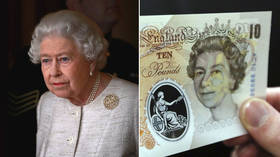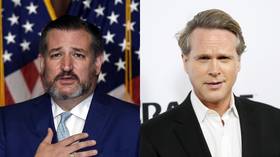Why, in 2021, do we Britons allow one incredibly wealthy and unaccountable family to fix the law for their own financial gain?

It’s been revealed that the Queen and Prince Charles have the power to secretly veto or alter legislation they don’t like. Never mind about returning power from Brussels to Westminster, let's get it back from Buckingham Palace.
Important news about the royal family has been revealed this week. No, not the fact that Princess Eugenie has given birth to a baby boy. Although, if you get all your news from the BBC, you can be forgiven for thinking this is the only royal story currently worth noting.
I’m sure the Queen is delighted with the arrival of her ninth great grandchild. But before we coo over the eleventh in line to the throne, we need to ask just how much power this ever-expanding family has over the rest of us.
Also on rt.com Leaked film banned by Britain’s Queen for cheapening the royal family is tame compared to how they’ve cheapened themselvesThis week, journalists at the Guardian managed to stop arguing about whether the necktie is a phallic symbol long enough to write about something we should all take seriously: the little known issue of ‘Queen’s consent’.
Under arcane and highly secretive procedures, the Queen and her eldest son, Prince Charles, get to vet potential laws long before they ever appear before our democratically elected representatives in the Houses of Parliament. This means that if they do not like the look of suggested legislation, they can ask for it to be amended, or even scrapped altogether, without the rest of us even knowing what had been proposed.
According to the royal family’s official website, “The role of the Sovereign in the enactment of legislation is today purely formal, although The Queen has the right ‘to be consulted, to encourage and to warn’ her ministers via regular audiences with the Prime Minister.” This is the image we have all become familiar with through popular programmes like The Crown. The Queen, as grandma to the nation, smiles and waves at us on ceremonial occasions, in between dispensing friendly words of wisdom to a series of hapless prime ministers.
But the reality, as the Guardian’s research makes clear, is that the Queen is far more than simply a national figurehead and her influence goes considerably beyond dishing out advice. Thanks to the Queen’s consent procedure, the monarch must be notified of any proposed legislation that may, in any way, affect the royal prerogative or “the hereditary revenues, the Duchy of Lancaster or the Duchy of Cornwall, and personal or property interests of the crown.”
It seems that the royal family, and – up until now – incurious journalists and constitutional scholars, have been more than happy either to keep the Queen’s consent procedures shrouded in secrecy or for us to believe that the process is merely a formality. But it turns out that a great deal of legislation affects the interests of the crown.
The Queen and Prince Charles are employers – so they need to consent to changes in employment legislation. They are landowners and so must give consent to new laws affecting land use. They pay tax and so are asked to consent to changes in tax laws. It is hard to think of many areas of life that do not impinge upon “the personal or property interests of the crown.” We know that between them, the Queen and her son have vetted over 1,000 laws.
And, it turns out, that Prince Charles, in particular, has not been shy about using Queen’s consent procedures to further his private interests. The Prince of Wales owns the £1 billion Duchy of Cornwall estate. Under law, some tenants have the right to buy outright a property they rent. But not those who rent from Prince Charles. Legal exemptions that he could have personally insisted upon, mean his tenants are denied the same rights as other renters. The financial value of the Duchy of Cornwall is thus preserved and the prince’s income is secured.
Unfortunately for the rest of us, Queen’s consent is about far more than allowing an already incredibly wealthy family to fix the law for their own financial gain. Too often, both critics and supporters of the monarchy defend their views in purely financial terms. On the left, people argue about costs to the taxpayer of royal weddings, maintaining palaces and round-the-clock security. They demand a slimmed-down bargain-basement monarchy. Meanwhile, those on the right tell us that royalty attracts tourists and that all the pomp and ceremony surrounding this one family generates considerable national revenue. They want more pageantry.
Both sides of this debate miss the point quite spectacularly. The main problem with the monarchy in general, and Queen’s consent legislation in particular, is democratic not financial. No one family, simply by dint of their birth, should have the right to veto or alter laws that impact upon the rest of us. We might vote in elections and send representatives to speak on our behalf in the House of Commons. But if a family no one has ever elected are able to ride roughshod over proposed legislation then we do not truly live in a democracy.
Some supporters of the monarchy see this hereditary sovereign power as a good thing. Imagine if we’d had a President Blair or a President Farage they cry. But they forget that an elected head of state – no matter how unpopular with some – can be booted out of office by the very same electorate that put them there. When it comes to the royal family, we do not have this right.
It is 2021 and Britain has, finally, left the EU. People voted to return power from Brussels to Westminster. We may not like all our politicians but we recognise that it is better power lies with people we can hold to account. We now need to go further and take all remaining vestiges of political power away from our unelected, unaccountable monarchy.
Like this story? Share it with a friend!
The statements, views and opinions expressed in this column are solely those of the author and do not necessarily represent those of RT.















